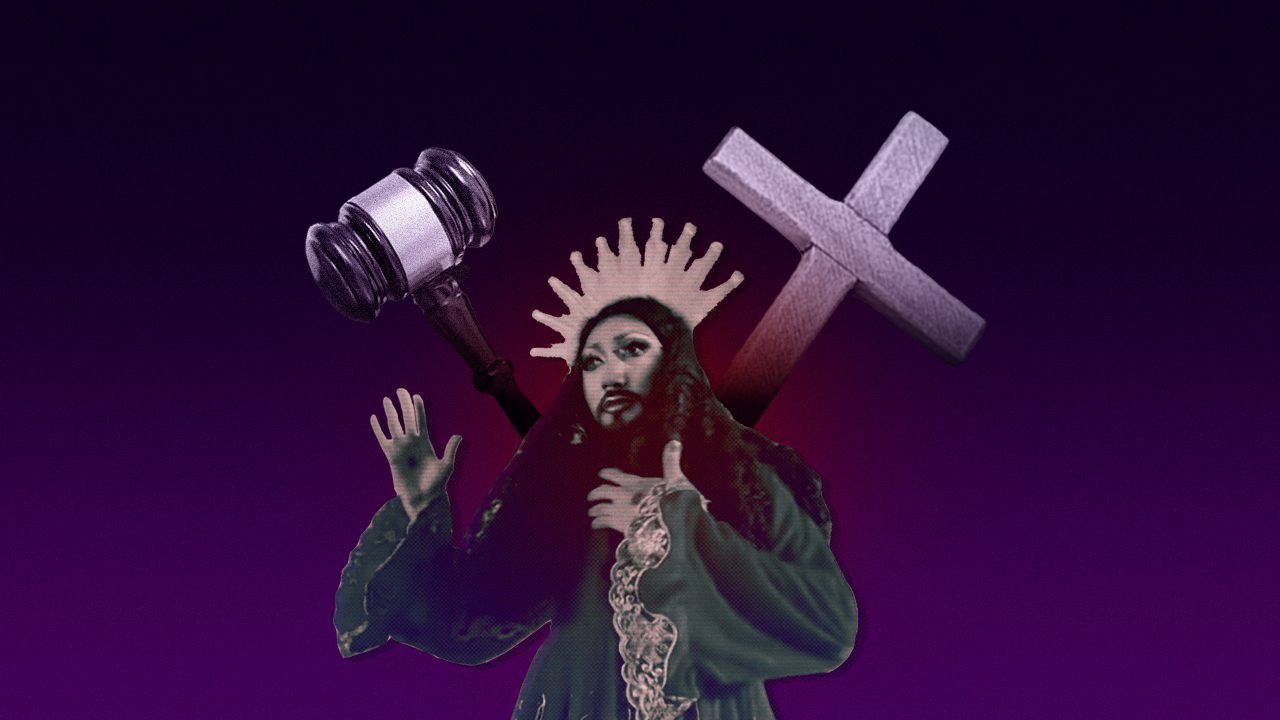SUMMARY
This is AI generated summarization, which may have errors. For context, always refer to the full article.

MANILA, Philippines – Art is liberation for many people – but it was art that put drag artist Pura Luka Vega behind bars.
Luka, who uses the pronouns they/them, was arrested by the Manila police on Wednesday, October 4, over an alleged violation of the Revised Penal Code (RPC), specifically Article 201, which pertains to the propagation of “immoral doctrines, obscene publications and exhibitions and indecent shows.”
The prevailing Revised Penal Code was enacted in the early 1930s.
Luka was allowed to post bail on Friday, October 6, and was released on Saturday afternoon, October 7.
‘Unwelcome person’
The case was filed in relation to Luka’s drag performance of a remix version of “Ama Namin (Our Father),” which went viral. Luka is a bearded drag artist, who portrays the image of Jesus Christ in some of their looks.
The “Ama Namin” performance was met by backlash. As of August 2023, Luka had been declared persona non grata – an “unwelcome person” – in at least 11 cities and municipalities in the Philippines.
After a series of persona non grata resolutions, legal complaints followed.
In July, the Philippines for Jesus Movement filed a complaint with the Quezon City prosecutor’s office. Another complaint was filed by the group Hijos del Nazareno-Central – devotees of the Black Nazarene – with the Manila prosecutor’s office.
Rod Singh, director of drag show “Drag Den,” where Luka appeared as one of the contestants, told Rappler that their camp only knew about the Manila complaint from the news. Luka failed to appear during the first preliminary hearing in Manila because they did not receive any subpoena. The second time, they failed to appear again because it coincided with the hearing on the Quezon City complaint.
Luka also faces a complaint before the National Bureau of Investigation. It was filed by CIBAC Representative Eddie Villanueva, a known critic of the bill prohibiting discrimination on the basis of sexual orientation and gender identity or expression.
Against the Constitution?
In suing Luka, the complainants alleged that the drag artist violated Article 201 of the RPC. Specifically, the drag artist was charged for the performance that allegedly “offend(s) any race or religion” under the law.
Although it was not used against Luka, a separate provision in the RPC – Article 133 – also punishes a person for “offending the religious feelings.”
Speaking to Rappler, University of the Philippines (UP) law professor Paolo Tamase said he believes these provisions violate the 1987 Constitution, the fundamental law of the land.
“First, they are worded so broadly that they prohibit protected speech. In the Philippines, speech as a rule is protected; the very narrow exceptions are libelous statements, obscenity, false or misleading advertisement, and fighting words,” Tamase explained.
“Statutes like the RPC can only prohibit speech that would fall under these exceptions. But Pura Luka’s ‘Ama Namin’ scene doesn’t fall under any of these, since ‘obscene’ pertains to sexual acts and not simply offensive acts,” the lawyer added.
Tamase said that the reference to religion in these laws “is a form of ‘establishing’ or privileging religion – something that is also prohibited by the Constitution.” Section 5 of the Bill of Rights in the 1987 Constitution states that “no law shall be made respecting an establishment of religion, or prohibiting the free exercise thereof.”
Tamase and another UP law professor, John Molo, also pointed out that these laws no longer apply to current social norms. In July, Molo explained that the Philippines’ current RPC is based on the Spanish Codigo Penal, which codified most of the criminal offenses of Spain and dated back to hundreds of years ago.
“It is arguable that the societal norms under which it was passed no longer apply. It’s of Spanish era vintage, and was key to keeping control over the colony…. The 1987 Constitution envisions a diverse, multi-religious society. This requires tolerance, not oppression,” Molo told Rappler.
Tamase had the same position: “Our society has become much more pluralistic since then, and the idea that people should be free to speak on almost any topic but must tread carefully when talking about certain religions seems like a step back.”
Efforts to repeal the law
Until 2022, there were efforts to correct the outdated law – but the push has yet to be successful.
In 2010s, the case of renowned tour guide and activist Carlos Celdran opened the discussion on the need to amend of the Spanish-era law.
Thirteen years ago – on September 30, 2010 – Celdran held up a sign that said “Damaso” during a mass at the Manila Cathedral. Padre Damaso is the villainous priest in Jose Rizal’s novel Noli Me Tangere.
Celdran was later found guilty of offending religious feelings. The case reached the Supreme Court, and the High Court ultimately upheld that the activist “meant to mock, insult, and ridicule those clergy whose beliefs and principles were diametrically opposed to his own.”
During the trial, Celdran’s lawyer Marlon Manuel said the law used against his client was “outdated and obsolete,” adding that “it has no place in our society now.” The lawyer also said that, based on his research, the last time a Filipino was found guilty of offending religious sentiments was during the 1930s.
Manuel added that, at the time, Celdran “may be the first post-World War II case and certainly the first under the 1987 Constitution.” In October 2019, Celdran died of natural causes. He was 46.
Recalling Celdran’s case, former justice secretary and then-senator Leila de Lima filed Senate Bill No. 628 in August 2019, which sought to amend Article 133. De Lima argued that the law “violates an individual’s constitutional right to freedom of speech and expression.”
The then-senator argued that, although there may be basis for an action for damages against Celdran, violation of Article 133 should no longer be considered a crime. The bill remained at the committee level until it became invalid when the 19th Congress started in 2022.
In October 2019, Albay 1st District Representative Edcel Lagman filed House Bill No. 5170, which sought to repeal the RPC. Lagman, who is also a lawyer, referred to the law as “archaic” and “an odious remnant of the Dark Ages.” The bill only reached the committee level.
Lagman refiled his bill when he was reelected in 2022. It is now numbered as HB No. 1477. As of August 1, 2022, the bill had been referred to the House committee on revision of laws.
The courts think otherwise
The Court of Appeals (CA) had a different perspective on the law. In deciding on Celdran’s case, it echoed the ruling of the Manila Regional Trial Court (RTC) that noted “the right to free speech does not guarantee an unbridled license to say whatever one may wish.”
“The RTC was correct when it found that in conformity with one’s right to free exercise of religion, the faithfuls may, within the limit set by laws, rightfully practice and observe their beliefs, unimpeded by unfair interference from other people,” the CA’s 23-page decision read. “It goes without saying that those people observing certain form of religion or sect are equally entitled to the state’s protection as any of its citizens.”
Celdran argued that the law allegedly shields religion from criticism.
The CA rejected this, saying the law imposes sanction on a person who performs acts that are offensive to the feelings of the people inside a place of worship during a religious ceremony. The appellate court added that Celdran “cannot give any additional meaning to the clear and plain language of the law.”
On the question of unconstitutionality, the CA said Celdran’s argument “lacks substance.”
“It should be borne in mind that religious freedom, although not unlimited, is a fundamental personal right and liberty, and has a preferred position in the hierarchy of values. It has been said that the religious clauses of the Constitution are all designed to protect the broadest possible liberty of conscience, to allow each man to believe as his conscience directs, to profess his beliefs and to live as he believes he ought to live, consistent with the liberty of others and with the common good,” the CA said in its ruling.
Won’t be the last?
Singh lamented that Luka’s performance stirred controversy when drag artistry was finally getting opportunities in the mainstream Philippine entertainment scene.
Although Luka faced complaints not for being queer per se but for the specific “Ama Namin” performance, the show’s director expressed fear that Luka’s case wouldn’t be an isolated one. Singh said it could embolden other quarters to target queer performers “until we don’t have a platform anymore…until we don’t have our voice again.”
Until the Philippine penal code is updated to respond to the times, the Celdrans and the Lukas in our midst would definitely not be the last. Should the public shift the spotlight to the lawmakers to take up the cause? – Rappler.com
Add a comment
How does this make you feel?
![[OPINION] Art, comedy, and the ‘right’ to offend](https://www.rappler.com/tachyon/2023/07/opinion-aboutpuraluka.jpg?fit=449%2C449)


![[The Wide Shot] Peace be with China](https://www.rappler.com/tachyon/2024/07/wideshot-wps-catholic-church.jpg?resize=257%2C257&crop=311px%2C0px%2C720px%2C720px)
![[OPINION] A critique of the CBCP pastoral statement on divorce](https://www.rappler.com/tachyon/2024/07/TL-cbcp-divorce-statement-july-19-2024.jpg?resize=257%2C257&crop=285px%2C0px%2C722px%2C720px)
![[REFLECTION] Mary, Mother of the West Philippine Sea](https://www.rappler.com/tachyon/2024/07/may-mother-west-ph-sea-july-19-2024.jpg?resize=257%2C257&crop=293px%2C0px%2C751px%2C750px)
![[OPINION] Ignorance and prejudice](https://www.rappler.com/tachyon/2024/07/tl-ignorance-and-prejujdice.jpg?resize=257%2C257&crop_strategy=attention)













There are no comments yet. Add your comment to start the conversation.